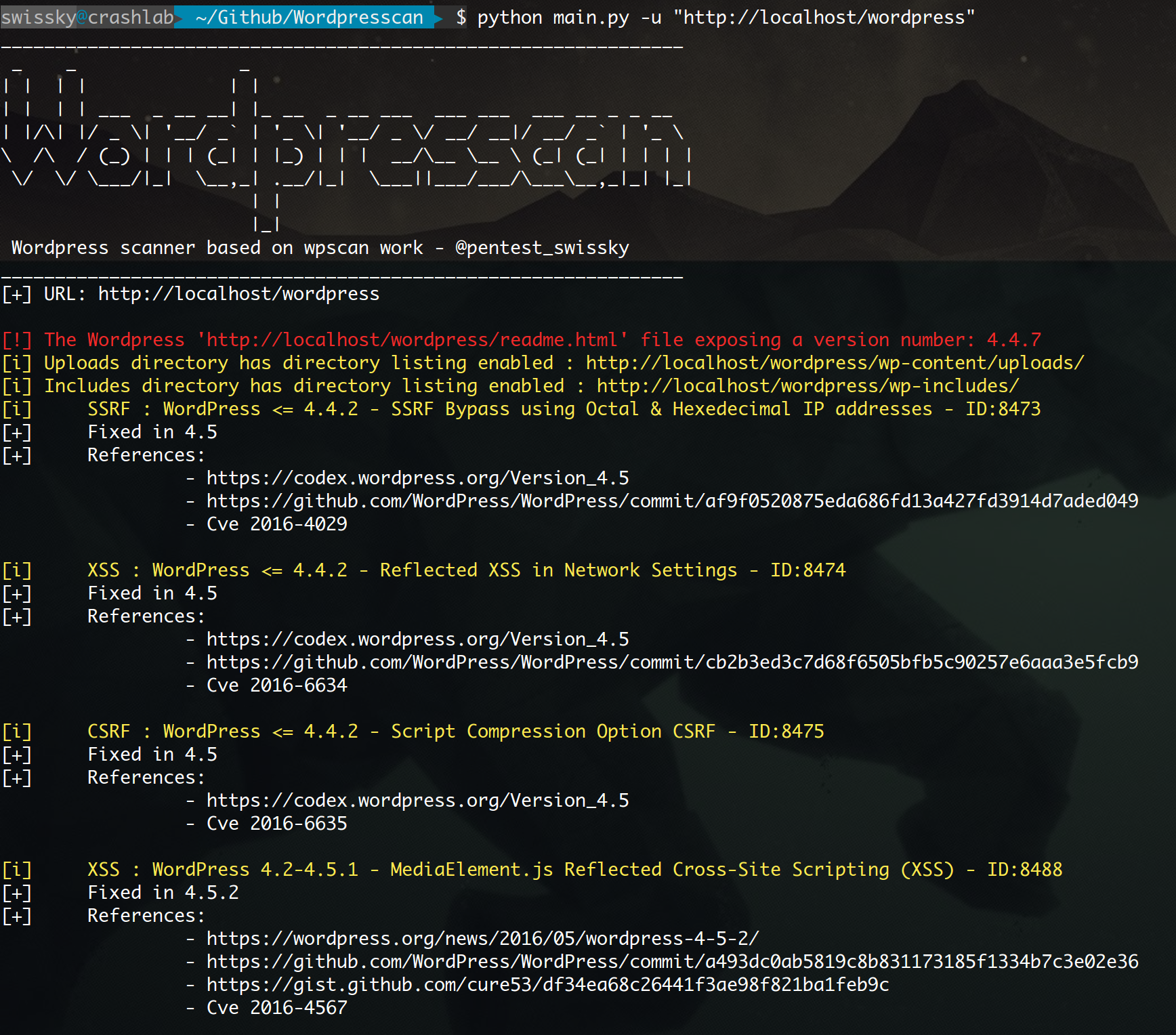104 lines
4.1 KiB
Markdown
104 lines
4.1 KiB
Markdown
# Wordpresscan
|
||
A simple Wordpress scanner written in python based on the work of WPScan (Ruby version), some features are inspired by WPSeku.
|
||
|
||
## Disclaimer
|
||
```
|
||
The authors of this github are not responsible for misuse or for any damage that you may cause!
|
||
You agree that you use this software at your own risk.
|
||
```
|
||
|
||
|
||
## Install & Launch
|
||
|
||
Install
|
||
```bash
|
||
git clone https://github.com/swisskyrepo/Wordpresscan.git
|
||
cd Wordpresscan
|
||
```
|
||
|
||
Virtualenv
|
||
```bash
|
||
virtualenv .venv -p /usr/bin/python2.7
|
||
source .venv/bin/activate
|
||
pip install -r requirements.txt
|
||
```
|
||
|
||
## Examples
|
||
### Example 1 : Basic update and scan of a wordpress
|
||
```powershell
|
||
python main.py -u "http://localhost/wordpress" --update --random-agent
|
||
|
||
-u : Url of the WordPress
|
||
--update : Update the wpscan database
|
||
--aggressive : Launch an aggressive version to scan for plugins/themes
|
||
--random-agent : Use a random user-agent for this session
|
||
```
|
||
|
||
### Example 2 : Basic bruteforce (option --brute, option --nocheck)
|
||
* bruteforce customs usernames
|
||
```powershell
|
||
python main.py -u "http://127.0.0.1/wordpress/" --brute --usernames "admin,guest" --passwords-list fuzz/wordlist.lst
|
||
```
|
||
* bruteforce with usernames list
|
||
```powershell
|
||
python main.py -u "http://127.0.0.1/wordpress/" --brute --users-list fuzz/wordlist.lst --passwords-list fuzz/wordlist.lst
|
||
```
|
||
* bruteforce detected users
|
||
```
|
||
python main.py -u "http://127.0.0.1/wordpress/" --brute --passwords-list fuzz/wordlist.lst
|
||
```
|
||
|
||
|
||
```powershell
|
||
╭─ 👻 swissky@crashlab: ~/Github/Wordpresscan ‹master*›
|
||
╰─$ python main.py -u "http://127.0.0.1/wordpress/" --brute --users-list fuzz/wordlist.lst --passwords-list fuzz/wordlist.lst --nocheck
|
||
_______________________________________________________________
|
||
_ _ _
|
||
| | | | | |
|
||
| | | | ___ _ __ __| |_ __ _ __ ___ ___ ___ ___ __ _ _ __
|
||
| |/\| |/ _ \| '__/ _` | '_ \| '__/ _ \/ __/ __|/ __/ _` | '_ \
|
||
\ /\ / (_) | | | (_| | |_) | | | __/\__ \__ \ (_| (_| | | | |
|
||
\/ \/ \___/|_| \__,_| .__/|_| \___||___/___/\___\__,_|_| |_|
|
||
| |
|
||
|_|
|
||
WordPress scanner based on wpscan work - @pentest_swissky
|
||
_______________________________________________________________
|
||
[+] URL: http://127.0.0.1/wordpress/
|
||
|
||
[!] The Wordpress 'http://127.0.0.1/wordpress/readme.html' file exposing a version number: 4.4.7
|
||
[i] Uploads directory has directory listing enabled : http://127.0.0.1/wordpress/wp-content/uploads/
|
||
[i] Includes directory has directory listing enabled : http://127.0.0.1/wordpress/wp-includes/
|
||
|
||
[i] Bruteforcing all users
|
||
[+] User found admin
|
||
[+] Starting passwords bruteforce for admin
|
||
Bruteforcing - ▓▓▓▓▓▓▓▓▓▓▓▓▓▓▓▓▓▓▓▓▓▓▓▓▓▓▓▓▓▓▓▓▓░░░░░░░░░░░░░░░░░░░░░░░░░░░░░░░░░░░░░░░░░░░░░░░░░░░░
|
||
```
|
||
|
||
### Example 3 : Thinking is overrated, this is aggressive, mostly not advised!
|
||
```powershell
|
||
python main.py -u "http://127.0.0.1/wordpress/" --fuzz
|
||
|
||
[i] Enumerating components from aggressive fuzzing ...
|
||
[i] File: http://127.0.0.1/wordpress/license.txt - found
|
||
[i] File: http://127.0.0.1/wordpress/readme.html - found
|
||
[i] File: http://127.0.0.1/wordpress/wp-admin/admin-footer.php - found
|
||
[i] File: http://127.0.0.1/wordpress/wp-admin/css/ - found
|
||
[i] File: http://127.0.0.1/wordpress/wp-admin/admin-ajax.php - found
|
||
[i] File: http://127.0.0.1/wordpress/wp-activate.php - found
|
||
--fuzz : Will fuzz the website in order to detect as much file, themes and plugins as possible
|
||
```
|
||
|
||
## Output example from a test environment
|
||

|
||
|
||
## Deploy a test environment
|
||
```bash
|
||
docker-compose -f wordpress_compose.yml up -d
|
||
```
|
||
To enable `wp-json` api you need to change "Permalink" to anything but "simple" in the settings.
|
||
|
||
## Credits and Contributors
|
||
* Original idea and script from [WPScan Team](https://wpscan.org/)
|
||
* Many PR and bugfixes from [bl4de](https://github.com/bl4de)
|